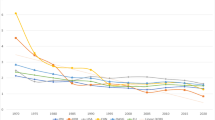Abstract
The absence of an industrial middle class in Arab Islamic countries has been, and still is, a major obstacle to national development. These countries, like others in the Third World, mostly inherited their systems of industrial education from former colonial or mandated powers, that is, from industrial nations, without taking into consideration the different social and socio-economic situation. A model is proposed here for a kind of industrial “university”, the Djamiat Al-Sináh. The name alludes to the Mosque as a centre of common activity, and tries to express the cultural and social contexts, and the target groups, of the institution. The model relies on social and industrial evolution, and meets the urgent need of Arab societies for an alternative to Eurocentric models. In the Djamiat, a practice-oriented education is to be provided, based on principles of professional efficiency and creativity, competence and entrepreneurial initiative. The students are to become co-ordinators, organizers, technicians and industrial trainers as well as independent small businessmen. The model is understood as a contribution to the education of an industrial middle class and to the promotion of trade and industry.
Zusammenfassung
Das Fehlen einer industriellen Mittelschicht in den arabischislamischen Ländern war und ist ein Haupthindernis für die nationale Entwicklung. Diese Länder haben ebenso wie andere Dritte-Welt-Länder ihre Systeme industrieller Ausbildung von früheren Kolonialherren oder Mandatsländern übernommen, das heißt von den Industrieländern ohne Rücksicht auf die geänderte soziale und sozialökonomische Situation. Es wird hier ein Modell für eine industrielle “Universität” vorgeschlagen, die Djamiat Al-Sináh. Der Name deutet auf die Moschee als Zentrum allgemeiner Aktivitäten hin und versucht, die kulturellen und sozialen Zusammenhänge und die Zielgruppen der Institution auszudrücken. Das Modell basiert auf der sozialen und industriellen Evolution und erfüllt das dringende Bedürfnis arabischer Gesellschaftssysteme nach einer Alternative zu eurozentrischen Modellen. In der Djamiat soll eine praxisorientierte Bildung angeboten werden, die auf den Prinzipien professioneller Effizienz und Kreativität, Kompetenz und unternehmerischer Initiative basiert. Die Studenten sollen Berufe wie Koordinatoren, Organisatoren, Techniker und industrielle Ausbilder, sowie unabhängige Kleinunternehmer ergreifen. Das Modell wird als ein Beitrag zur Ausbildung einer industriellen Mittelschicht und zur Förderung von Handel und Industrie verstanden.
Résumé
L'absence d'une classe industrielle moyenne dans les pays arabes islamiques a été, et est toujours, un obstacle majeur au développement national. Ces pays, comme d'autres du Tiers Monde, ont pour la plupart hérité leurs systèmes d'éducation industrielle des anciennes puissances coloniales ou mandataires, c'est-à-dire des nations industrielles, sans qu'on ait pris en considération leur situation sociale et socio-économique différente. On propose ici un modèele d'“université” industrielle, appelé Djamiat Al-Sináh. Ce nom compare la mosquée à un centre d'activité commune et s'efforce d'exprimer les contextes culturels et sociaux, et les groupes-cibles, de l'institution. Ce modèle repose sur l'évolution sociale et industrielle, et répond au besoin urgent des sociétés arabes d'une solution de remplacement aux modèles centrés sur l'Europe. Au Djamiat, l'enseignement doit être orienté vers la pratique et se fonder sur les principes de l'efficacité professionnelle et de la créativite, de la compétence et du sens de l'entreprise. Les étudiants y sont formés pour devenir des coordinateurs, des organisateurs, des techniciens et des formateurs industriels ainsi que de petits hommes d'affaires indépendants. Ce modèle est considéré comme une contribution à la formation d'une classe industrielle moyenne et à la promotion du commerce et de l'industrie.
Similar content being viewed by others
References
Abdus Salam, M. 1984.Der Islam 11 (Zürich).
Axt, H.-J., Karcher, W. and Schleich, B., eds. 1987.Ausbildungs- oder Beschäftigungskrise in der Dritten Welt? Frankfurt am Main: Interkulturelle Kommunikation.
Gottstein, K., ed. 1986,Islamic Cultural Identity and Scientific-Technological Development. Baden-Baden: Nomos.
Greinert, W. D. (no date)Systeme beruflicher Bildung im internationalen Vergleich. Berlin: Institut für Berufliche Bildung, TU Berlin.
Hunke, S. 1990.Allahs Sonne über dem Abendland (unser arabisches Erbe). Frankfurt am Main: Fischer Taschenbuch Verlag (First printing 1960).
Kerschensteiner, G. 1966.Berufsbildung und Berufsschule. Paderborn: Schöningh.
Khalid, D. 1982.Reislamisierung und Entwicklungspolitik. Köln: Weltforum.
Müllges, U. ed., 1966.Handbuch der Berufs- und Wirtschaftspädagogik, Bd. 2. Düsseldorf: Schwann.
Odeh, I.1991.Berufliche Bildung für die arabische Bevölkerung in Israel. Darstellung, Analyse und ein Weiterführendes Modell (Doctoral dissertation, University of Hamburg, Germany, 1991). Frankfurt am Main: Peter Lang.
Roderic, D., Mathews, J. and Akrawi, M. 1950.Education in Arab Countries of the Near East. Washington, DC: American Council on Education.
Spranger, E. 1968.Grundlegende Bildung, Berufsbildung, Allgemeinbildung. Heidelberg: Quelle und Meyer.
Tibi, B. 1981.Die Krise des modernen Islam. München: E. H. Beck.
Thiel, 1987. In Axt, H.-J., Karcher, W. and Schleich, B., eds.Ausbildungs-oder Beschäftigungskrise in der Dritten Welt? Frankfurt am Main: Interkulturelle Kommunikation.
Rights and permissions
About this article
Cite this article
Odeh, I.A. The education of an industrial middle class in Arab-Islamic countries. Int Rev Educ 39, 307–317 (1993). https://doi.org/10.1007/BF01102410
Issue Date:
DOI: https://doi.org/10.1007/BF01102410




